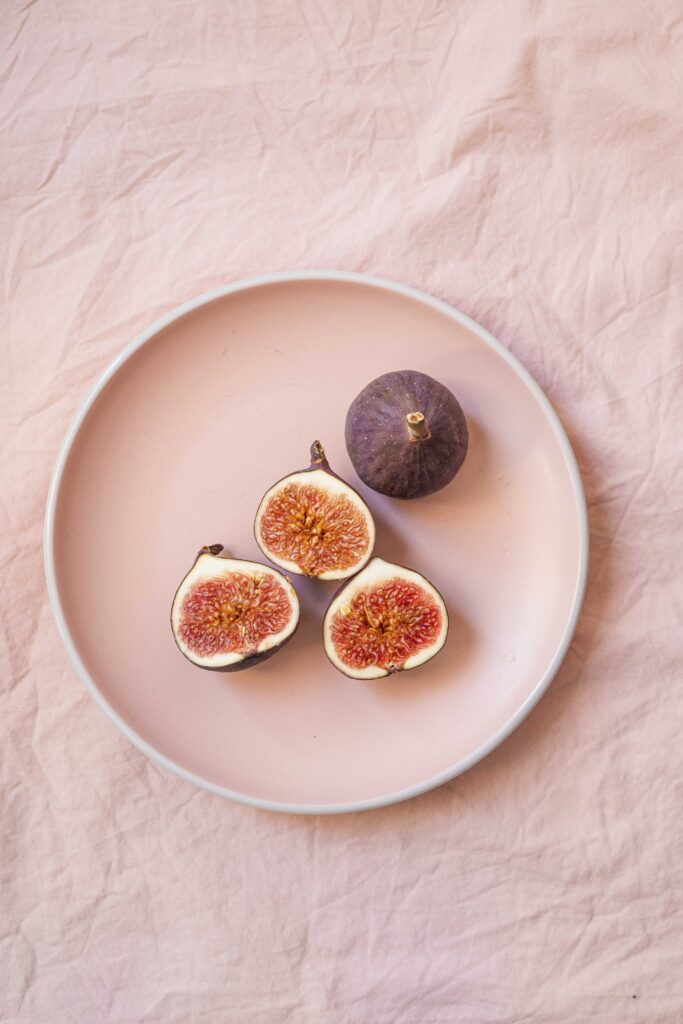Even for the most well-intentioned New Year’s resolutions—like minimizing PMS symptoms—it can be hard to know where to start. Especially when it comes to hormone balance. So, let’s kick off 2023 by debunking hormone nutrition myths. After all, there is a lot of misinformation out there. Knowing what you should (and shouldn’t) do to balance your hormones is confusing. As a woman with PCOS, I get it. Ultimately, hormones are extremely nuanced. And when it comes to nutrition, the science is ever-changing. So, where’s the truth? Today, let’s set the record straight. Or in the very least, take a bio-individual approach.

WHY ARE HORMONES IMPORTANT?
Hormones are your body’s chemical messengers. They control practically all major processes. They regulate growth, sex drive, reproduction, metabolism, fertility, and thirst—among other things. Simply put, they let the body know what to do (and when to do it). In turn, you operate at your maximum! However, when your hormones are unbalanced, things can go awry. Think: unwanted weight gain, an irregular period, PCOS, low libido, digestive woes, poor sleep, PMS, and more. Once you know which hormone nutrition myths to ignore, you’ll be that much more equipped to balance your hormones, naturally.
DO YOU HAVE A HORMONAL IMBALANCE?
Produced in the endocrine glands, hormones help control what (and when) certain bodily processes happen. Although very powerful, they’re equally sensitive. Hormones are easily influenced by lifestyle factors: diet, exercise, stress, sleep, and medication. One—or all—of these factors can throw your hormones out of balance. And this imbalance takes a toll. For example, do you experience absent, irregular or painful periods, tender breasts, digestive issues, a sluggish metabolism, fatigue, constant cold hands / feet, unexplained weight gain or loss, and / or chronically poor sleep? If so, you may have an underlying hormone imbalance.
What tests show a hormone imbalance?
Whether or not you believe you have a hormone imbalance, it’s always beneficial to know your hormone levels. In the very least, consider getting them tested every year! Helpful tests include: a full thyroid panel, A1C (or consider wearing a continuous glucose monitor!), vitamin D, cortisol, and progesterone (which is typically tested on day 21 of your cycle), follicle stimulating hormone (tested on day 3 of your cycle), and estradiol (also tested on day 3 of your cycle),
Your OB/GYN can order blood tests to check hormone levels. Otherwise, consider working with a functional medicine practitioner. Alternatively, you can register with Everlywell for at-home blood work.

HOW COMMON IS HORMONAL IMBALANCE?
Very. These days, hormone irregularities are remarkably common. In fact, studies show that upwards of 80% of women suffer from hormone imbalances. PCOS, for example, affects approximately 5 million women in the United States. Including myself. That makes this condition one of the most common hormonal endocrine disorders among women of reproductive age. In essence, when you have a hormonal imbalance, you have too much or too little of a particular hormone. When your endocrine glands don’t secrete enough (or too much) of a particular hormone, things go awry. From high cortisol to low testosterone, fluctuations in hormone levels are usually a result of lifestyle factors. And while hormone levels are supposed to fluctuate throughout your lifetime, chronically high or chronically low levels wreak havoc.

use nutrition to Heal your hormones
Diving right in: what you eat is either helping or hurting your hormones. In other words, your diet plays a significant role in hormonal production (and maintaining healthy hormonal balance!). The right foods—and the right balance of these foods—can ensure happy hormones. Au contraire, consuming too many inflammatory oils, processed foods, and sugar can cause imbalances. In turn, wreaking havoc on your body. However, rest assured that you can bring your body into balance without adhering to strict rules, guidelines, or diets. Let the following hormone nutrition myths support your hormone healing journey. Knowledge is power.
We’re All Bio-Individuals
Before we chat hormone nutrition myths, it’s important to recognize our uniqueness. We’re all bio-individuals. Meaning, we each have different nutritional needs, circumstances, lifestyle preferences, and accessibility. All of these factors contribute to our health and wellness goals. Ultimately, there’s no universal approach to health and nutrition. Instead, we’re unique in our biological makeup. Your requirements aren’t the same as mine. Embrace this! We can’t expect to be our healthiest selves by following the same rules, paths, and expectations of others. Use this to your advantage—especially when it comes to hormone nutrition myths.

8 Hormone nutrition myths
When it comes to nutrition, be your own detective. With bio-individuality in mind, consider the following questions: which foods give you lasting energy (not a blood sugar crash)? What meals do you enjoy making that are easy to prepare? Are there ingredients you don’t digest well? How much food do you need to truly feel satisfied? Do you restrict certain foods because you’ve heard they’re unhealthy—even through you tolerate them just fine (i.e. gluten)? Ultimately, the more you crowd out nutrition myths / tidbits that don’t pertain to you—and the more you pay attention to your body’s feedback—the easier it is to fuel yourself from a place of love and acceptance.

1. You need to count calories
Two women can eat the same number of calories and have two very different hormonal outcomes. Truth is, how your body burns calories depends on many factors—where you’re at in your cycle, your metabolism, the type of organisms in your gut, etc. Although food tracking can be a useful tool initially, it’s not right for everyone. Instead, prioritize building balanced meals: 20-30 grams of quality protein (chicken, fish, pastured eggs, etc.), 1/2 plate non-starchy vegetables, one serving of starchy carbs, and 1-2 sources of healthy fats. If fat loss is a necessary part of your hormone balancing journey, know that there’s no need to obsess over your calorie intake.
See here for my hormone balancing diet plan!
2. a Detox Diet balances hormones
A detox might sound enticing, but there’s little evidence that dietary cleanses do any of the things they promise. Fact is, you don’t need to purchase a detox supplement or sip detox tea to balance your hormones. If your liver, kidneys and gastrointestinal tract are functioning properly, they’re doing a substantial job detoxing—every day. However, there are certain foods that are better for balancing hormones than others. Grab that list, here. All of that said, it is helpful to take inventory of the potential toxins and unnecessary chemicals in your house.
If your blood work shows you’re high in estrogen, consider eating specific foods that help detox excess estrogen from the body.
3. eat small, frequent meals
Eating small, frequent meals is a method thought to boost metabolism and support hormone health. While a few studies support these recommendations, others show no significant benefit. In fact, some research suggests it may be more beneficial to stick fewer, larger meals. We’re all different! You want to find what works best for you. Not sure where to start? Consider wearing a continuous glucose monitor to track how your blood sugar responds to what you eat. This personalized data will help steer you toward fewer, larger meals or smaller meals and snacks.
4. Keto is the way to go
Not so fast. Not only are you missing out on key essential nutrients, but keto can act as a major stressor—and stress is a significant underlying factor for hormone imbalance. For most, the keto diet depletes the body of energy, electrolytes, and can cause gastrointestinal issues. It’s also not safe during pregnancy . Furthermore, it’s very unlikely that keto will improve your relationship with your body (and isn’t that the goal?). All of that said, depending on your specific hormonal imbalance(s), you may be a candidate to try keto—and have success eating a lower-carb diet. See here for what this gynecologist has to say.
5. Limit your carbs
Speaking of keto, the low-carb diet trend continues to make an appearance in the health world. It gives carbohydrates—like fruit and whole grains—a bad reputation. There’s even such thing as carbohydrate phobia (sigh). At the end of the day, any diet or eating program that eliminates an entire food group gets a red flag. For almost all health goals—particularly balancing hormones—cutting complex carbs is not the answer. Beyond instigating disordered eating habits, significantly reducing carbs shifts serotonin levels, progesterone, and insulin metabolism. And we need serotonin, progesterone, and adequate glucose for everything from sustained energy to hormone balance. Instead, aim to pair carbs with protein and fat.
6. remove gluten and soy
If you’re eating to heal hormones, you might be wondering—what about gluten and soy? Not only are these demonized on social media, but various schools of thought encourage limiting these ingredients to achieve hormone balance. So, what does the research actually say?
GLUTEN
Gluten brings with it claims of causing leaky gut and inflammation. And inflammation is a root cause of hormonal imbalance. But is gluten—in and of itself—to blame? Outside of a true gluten sensitivity or celiac disease, there isn’t significant research to prove that avoiding gluten is beneficial for hormone balance. Rather, it’s more important to think about the quality of gluten you’re consuming. When in doubt, choose organic grains. Opt for packaged loaves with minimal ingredients and no added sugar. Ultimately, removing grains may help hormones balance short term (by means of lowering acute inflammation), but it’s not necessary, long-term. Most women can work on rebalancing their gut microbiome so that they can consume grains as a part of a healthy, well-rounded diet.
SOY
When it comes to hormone balance, soy is also highly debated. It’s widely studied for its estrogenic and anti-estrogenic effects on the body. Studies may seem to present conflicting conclusions about soy, but this is largely due to the wide variation in how soy is studied. Good news: results of recent population studies suggest that soy has either a beneficial or neutral effect on various health conditions. Soy is a nutrient-dense source of protein that can be consumed, beneficially, in moderation. When possible, opt for unprocessed, organic, and fermented soy. Think: tempeh, miso, and tamari. Caveat—women with estrogen-dominance hormonal imbalance conditions are particularly sensitive to the phytoestrogens in processed soy (this includes endometriosis, PCOS, fibroid sufferers and those with ovarian cysts). At any rate, it’s best to consume your soy intake with your doctor or healthcare provider.
7. Intermittent fast for hormone balance
Preliminary research shows a surprising amount of benefits to intermittent fasting. However, adhering to strict feeding times (and ignoring your hunger signals) is a slippery slope. Often, this diet turns into a very disconnected relationship with your body. You’re saying, “I am not going to listen to my body—I’m going to listen to this diet, instead.” Again, not the goal. Like eating lower carb, intermittent fasting works for some but not for all. In fact, many schools of thought advocate for eating within 30-60 minutes of waking. When you provide your body with consistent fuel (eating balanced meals every 3-4 hours), you’re supporting stable blood sugar and keeping stress hormones at bay.
8. HIIT Is The best form of exercise
If your hormones are very low, HIIT will actually be the least helpful. At the end of the day, the most effective form of exercise is the one you look forward to doing. Said differently: you’ll reap the benefits of a healthy heart, lean muscle mass, optimal digestion, body confidence, and balanced hormones when moving your body doesn’t feel like a chore (or overly challenging). Most experts encourage focusing on things like dumbbells, resistance bands, resistance machines, and bodyweight exercises to build a strong, healthy body. Ideally, your weekly workouts should engage all major muscles. But for the sake of overall wellbeing, exercise is less about the intensity and more about commitment—honoring time (even if it’s 10 minutes) to walk, stretch, jog, dance, etc.

Be Your Own Health Advocate
To wrap this up, I want to encourage you to be your own health advocate. In recent years, there has been a solid, steady push toward patient empowerment. As conscious beings, we’re waking up to the value of our own health care. We’re beginning to advocate for ourselves. We’re getting involved in the decision-making process. And there are countless benefits to this: increased confidence in your health-related decisions, improved medical literacy, and hopefully, better wellbeing outcomes! Make 2023 the year you actually become your own health advocate—ignoring hormone nutrition myths that don’t pertain to you.
Hormone balance ebook
Ready to take the next step in your hormone-healing journey? Grab your copy of Master Your Menstrual Cycle—my holistic guide to balancing your hormones with ease. Available for only $15!
Images courtesy of Unsplash. This article contains affiliate links. Thank you for supporting Wellness with Edie! This article is for informational purposes only. It is not, nor is it intended to be, a substitute for professional medical advice, diagnosis, or treatment and we recommend that you always consult with your healthcare provider.



Leave a Reply